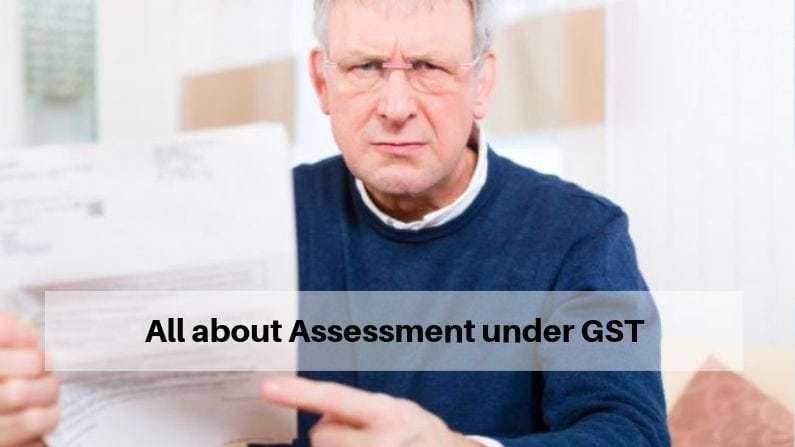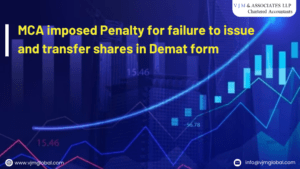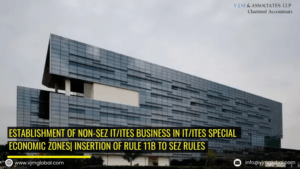“Assess” is an English term which is used in common parlance also, apart from Goods and Service Tax (“GST”). Meaning of “assess” in common parlance is to evaluate or estimate something e.g. price, nature, quality etc.
Accordingly, Assessment under GST term is used to determine GST liabilities of GST payable. Such process of assessment can be carried out by assessee himself or any by any officer designated by Central Goods and Service Tax Act, 2017 (“CGST Act”).
Provisions related to GST have been given under section 59 to 64 of the CGST Act read with Rule 98 to 100 of Central Goods and Service Tax Rules, 2017 (“CGST Rules”)
1. What is Assessment under GST
As per Section 2(11) of CGST Act, “Assessment” means determination of tax liability under CGST Act and it includes following types of assessment:
- Self-Assessment
- Re-assessment
- Provisional Assessment
- Summary Assessment
- Best Judgement Assessment
2. Types of Assessment under GST
As per GST provisions, there are six types of assessment under GST has been given.
- Self Assessment under GST (Section 59)
- Provisional Assessment under GST (Section 60)
- Scrutiny of Returns (Section 61)
- Assessments of Non – Filers of Returns (Section 62)
- Assessment of unregistered person under GST (Section 63)
- Summary Assessment under GST (Section 64)
Detail explanation of each type of GST assessments are as follows.
3. Self Assessment under GST (Section 59 of CGST Act)
As per Section 59, primary liability of computation of GST payable lies on assessee himself. Accordingly, assessee will compute the GST payable on his own and will furnish the periodic return under section 39 for each tax period after payment of such computed tax liability. Presently, liability to pay self assessed GST arises at 20th of each month.
4. Provisional Assessment under GST (Section 60 of the CGST Act read with Rule 98 of CGST Rules)
4.1 Applicability of provisional assessment
Provisional assessment is not applicable in general. A taxpayer opts for provisional assessment in following cases:
- Where he is unable to determine taxable value of goods or service or both or
- Where he is unable to determine rate of tax applicable.
4.2 Application for payment of tax on provisional basis
As per section 60(1) of the CGST Act read with Rule 98(1) of the CGST Rules, taxable person may request assessing officer in writing for payment of tax on provisional basis. Taxable person is required to mention reason for such manner of payment.
Taxable person shall file such application in form GST ASMT-01 on common portal alongwith documents in support of his request.
4.3 Approval of payment of GST on a provisional basis (Section 60(1) of the CGST Act read with Rule 98(2) & 98(3) of the CGST Rules)
Proper office shall verify the filed application and if he requires any additional documents or information then he shall issue a notice in form GST ASMT-02 to taxable person to furnish such additional documents or information.
Taxable person shall furnish reply to such notice in form GST ASMT-03 and he may also appear in person before proper officer if required.
After receiving required information or document, proper officer shall issue an order in form GST ASMT-04 allowing payment of tax on a provisional basis. Order shall also indicate value or the rate or both on the basis of which applicant should pay tax on provision basis.
Proper officer is required to issue an order within 90 days from date of receipt of application.
4.4 Execution of bond (Section 60(2) of the CGST Act read with Rule 98(4) of the CGST Rules)
Taxable person shall be allowed for payment of GST on provisional basis only if he executes a bond with surety or security. Such bond shall bind the taxable person for payment of difference between the amount of tax as may be finally assessed and the paid on provisional basis.
Taxable person is required to execute bond in form GST ASMT-05 for an amount equal to integrated tax, central tax, state tax and cess payable in respect of the transaction for which bond is executed. Further, such bond shall be backed up with security in form of bank guarantee for an amount not exceeding 25% of the amount covered under bond.
4.5 Final Assessment Order (Section 60(3) of the CGST Act read with 98(5) of the CGST Rules)
Proper officer shall issue a notice in form GST ASMT-06 requiring information or document which he may require to finalise assessment.
Proper officer shall issue an order in form GST ASMT-07 finalising the assessment and shall specify the amount payable or refundable by taxable person. Officer is required to pass such order within 6 months from date of communication of order in Form GST ASMT-04.
Please note that period of such 6 months may be extended by joint commissioner or additional commissioner for a further period of 6 months. However, commissioner may extend such period by further 4 years.
4.6 Payment of differential tax or refund of differential amount under Provisional Assessment (Section 60(4) and 60(5) of CGST Act)
Taxable person shall pay the amount determined as payable by proper officer in order passed in GST ASMT-07.
In addition to the tax amount, taxable person shall also pay interest under section 50(1) for the period starting from first day after due date of payment of tax till the date of payment of tax. E.g., Taxable person opt for provisional assessment for the month of April, 2019. GST for the month of April, 2019 is payable by 20th May, 2019. Proper officer passes final assessment order in form GST ASMT-07 on 10th July, 2019 corresponding to which tax is paid by taxable person on 20th July, 2019. Accordingly, taxable person shall pay the interest for the period of 21st May, 2019 to 20th July, 2019.
4.7 Release of Security or Bond under Provisional Assessment (Rule 98(6) & 98(7) of the CGST Rules)
If registered person is entitled to any refund as per order issued in form GST ASMT-07 then he shall be entitled to get interest under section 56 also.
After issuance of order for finalization of assessment, applicant may apply for the release of security furnished. Applicant shall file application in form GST ASMT-08.
Within 7 working days from receipt of application, proper officer shall issue the order in form GST ASMT-09 to release the security. Before allowing release of security, proper officer shall make sure that applicant has paid additional tax liability determined on final assessment.
5. Scrutiny of Returns (Section 61 of the CGST Act read with Rule 99 of CGST Rules)
5.1 Scrutiny of Returns and issuance of notice to seek additional information
Proper officer may select any return for scrutiny. Proper officer shall scrutinize the correctness of details and particulars furnished in such return on the basis of information available with him.
If any discrepancy is noticed by proper officer, then he will issue a notice in form GST ASMT-10 to the assessee informing him about the discrepancy noticed and will ask him to furnish the requisite information. Assessee is required to furnish such information within 30 days from date of service of notice or within such time as may be specified by proper officer in notice.
Whiling issuing notice, proper officer will quantify the amount of GST liabilities, interest or any other payable with respect to discrepancy, if possible.
5.2 Acceptance of Discrepancy or furnishing of additional information
The assessee may accept the discrepancy mentioned in the notice by the proper officer and proceed for payment of additional tax liability raised in the notice issued to him or the assessee may furnish an explanation to the proper officer as asked in the notice.
Assessee shall inform the proper officer about payment of additional tax liability or shall furnish the information in form GST ASMT-11.
5.3 Acceptance of information furnished by assessee
If proper officer satisfies himself with the information furnished by assessee then he will inform the assessee about the same in form GST ASMT-12. No further action will be required in this case.
5.4 Initiation of proceedings against assessee under GST
Proper officer may initiate proceedings against assessee in either of the following case:
- If assessee fails to furnish satisfactory information within 30 days of being informed by the proper officer or such further time as may be permitted by proper officer or
- If assessee fails to take corrective action after acceptance of discrepancy pointed by proper officer
Proper officer shall take appropriate action against assessee including under either of the following section:
- Section 65: Audit by tax authorities
- Section 66: Special Audit
- Section 67: Power of inspection, search or seizer
- Section 73: Determination of tax not paid or short paid or erroneously refunded or input tax credit wrongly availed or utilized for any reason other than fraud or any wilful misstatement or suppression of facts.
- Section 74: Determination of tax not paid or short paid or erroneously refunded or input tax credit wrongly availed or utilized by reason of fraud or any wilful misstatement or suppression of facts.
5.5 Practical Points to be kept in Mind
- It has been seen under GST that the taxpayer tends to ignore notices issued under and fails to furnish any suitable reply. Any notice issued under section 61 should not be avoided and any negligence can result in search of premises of taxpayer or audit under CGST Act.
- Make sure that every notice by department should bears a Document identification number (“DIN”). Quoting of DIN on all notices is mandated with effect from 8th November, 2019. Any document issued with DIN shall be considered as invalid. (Circular No. 122/41/2019-GST dated 5ht November, 2020).
- DIN quoted on notice can be verified on https://esanchar.cbic.gov.in/DIN/DINSearch.
- Mere communication of notice over email is not sufficient. Every notice and order should be uploaded on GST portal otherwise it shall be considered as void as decided by Hon’ble High Court of Madhya Pradesh in the matter of M/S. SHRI SHYAM BABA EDIBLE OILS VERSUS THE CHIEF COMMISSIONER AND ANOTHER (W. P. No. 16117/2020 dated 19th November, 2020). However, a contrary stand may be taken by hon’ble apex court.
- During return filing, every taxpayer should disclose the value of exempted supplies and non-taxable supplies in the appropriate column. Non-disclosure can be considered as suppression of information and proper officer can invoke Section 73 or 74 of CGST Act.
- Few illustrative grounds which can be considered as “Discrepancy” by proper officer and notice can be issued under section 16:
- Mismatch of turnover declared in GSTR-1 and GSTR-3B.
- Mismatch of ITC claimed in GSTR-3B and ITC auto-populating in GSTR-2A and GSTR-2B.
- Accumulation of ITC over the period of tax and no payment of output GST liability in cash.
- Inward and outward supplies appearing at different GST rates for trading concerns.
- To avoid any notice under Section 61, taxpayers should make sure that necessary reconciliation is made for amounts given under different returns.
6. Assessment of Non-filer of returns (Section 62 of the CGST Act read with Rule 100(1) of the CGST Rules)
6.1 Applicability of Assessment under Section 62
If any registered person fails to furnish any return u/s 39 i.e. Monthly Returns or section 45 i.e. Final Return even after furnishing notice for filing of return under section 46 i.e. notice to return defaulters then proper officer may proceed to assess the tax liability of such person on best judgement basis.
6.2 Time Limit for issuance of Assessment Order
Such assessment order can be issued within a period of 5 years from the date or due date of furnishing of annual return for such the financial year.
Proper officer shall issue the order of assessment in form GST ASMT-13 and a summary of such order shall be uploaded electronically in form GST DRC-07.
6.3 Withdrawal of assessment order
If registered person furnishes a valid return within a period of 30 days of the service of such assessment order then such assessment order shall be deemed to have been withdrawn. However, liability towards payment of interest or for payment of late fee under shall continue.
6.4 Practical Points to be kept in Mind:
- A system generated mail in form GSTR-3A is received to all non-filers alongwith a message on registered person. Accordingly, necessary action should be taken against any notice within stipulated time.
- For the purpose of self assessment, proper can use information available at following points:
- Details of outward supplies in form GSTR-1.
- Inward supplies auto-populating in form GSTR-2A & GSTR-2B
- Details of Supplies through e-commerce operator can be extracted through TCS & TDS return filed by e-commerce operator.
- Details of Supplies to the government can be extracted through TCS and TDS return filed by recipient of goods.
- E-waybills etc.
- Proper officers are also cancelling GST registration of GST return defaulters.
7. Assessment of unregistered person under GST (Section 63 of the CGST Act read with Rule 100(2) of the CGST Rules)
7.1 Applicability of assessment of unregistered person under GST under section 63
In case taxable person
- fails to register under GST even though he is liable to do so or
- whose registration is cancelled but who was liable to pay tax
then the proper officer may proceed to determine the tax liability of such taxable person to the best of his judgment for the relevant tax periods.
7.2 Issuance of notice for assessment of unregistered person under GST
Proper officer shall issue a notice in form GST ASMT-14 within a period of five years from the date or due date of furnishing of annual return for such the financial year. Proper officer will upload the summary of such assessment order electronically on portal in form GST DRC-01.
7.3 Time Limit and manner of finalisation of assessment of unregistered person under GST
After allowing a time period of 15 days, proper officer will pass an order in form GST ASMT-15 and will also upload the summary thereof electronically in form GST DRC-07.
7.4 Practical points to be kept in mind
- Many taxpayers have the perception that with cancellation of GST registration, the taxpayer is no more liable to pay any GST liability understated by him. However, this is not the case. Proper officer may take action under Section 63 of CGST Act.
- In case of unregistered person, proper officer can become aware about liability of a taxpayer person through follow information:
- Total turnover declared in Income Tax Returns.
- Total turnover declared by companies in a Financial statement with the registrar of Company.
- SFT details furnished by banks about bank deposits.
- Details of income on which TDS is deducted under Income Tax Act.
8. Summary assessment under GST in certain special cases (Section 64 of the CGST Act read with Rule 100(3), 100(4) or 100(5) of the CGST Rules)
8.1 Applicability of Summary Assessment under GST
If proper officer has any evidence of following
- that there is any tax liability pertaining to a person then after obtaining approval of additional commission or joint commissioner such proper officer shall proceed to assess the tax liability of such person to protect the interest of revenue.
8.2 Issuance of Summary Assessment order
Proper officer shall issue the assessment order in form GST ASMT-16 and will also upload the summary thereof electronically on GST portal in form GST DRC-07.
9. Identification of taxable person under Summary Assessments
Further, if proper officer is not able to identify the concerned taxable person to whom the liability pertains and such liability pertains to supply of goods then person in charge of such goods shall be deemed to be the taxable person liable to be assessed and liable to pay tax and any other amount.
9.1 Withdrawal of Summary Assessment order issued under section 64
The taxable person may file an application within 30 days from the date of receipt of the order in form GST ASMT-17 for withdrawal of such assessment order after GST registration.
Consequently, assistant commissioner or joint commission shall either order to withdraw such order or rejection of application in form GST ASMT-18.






